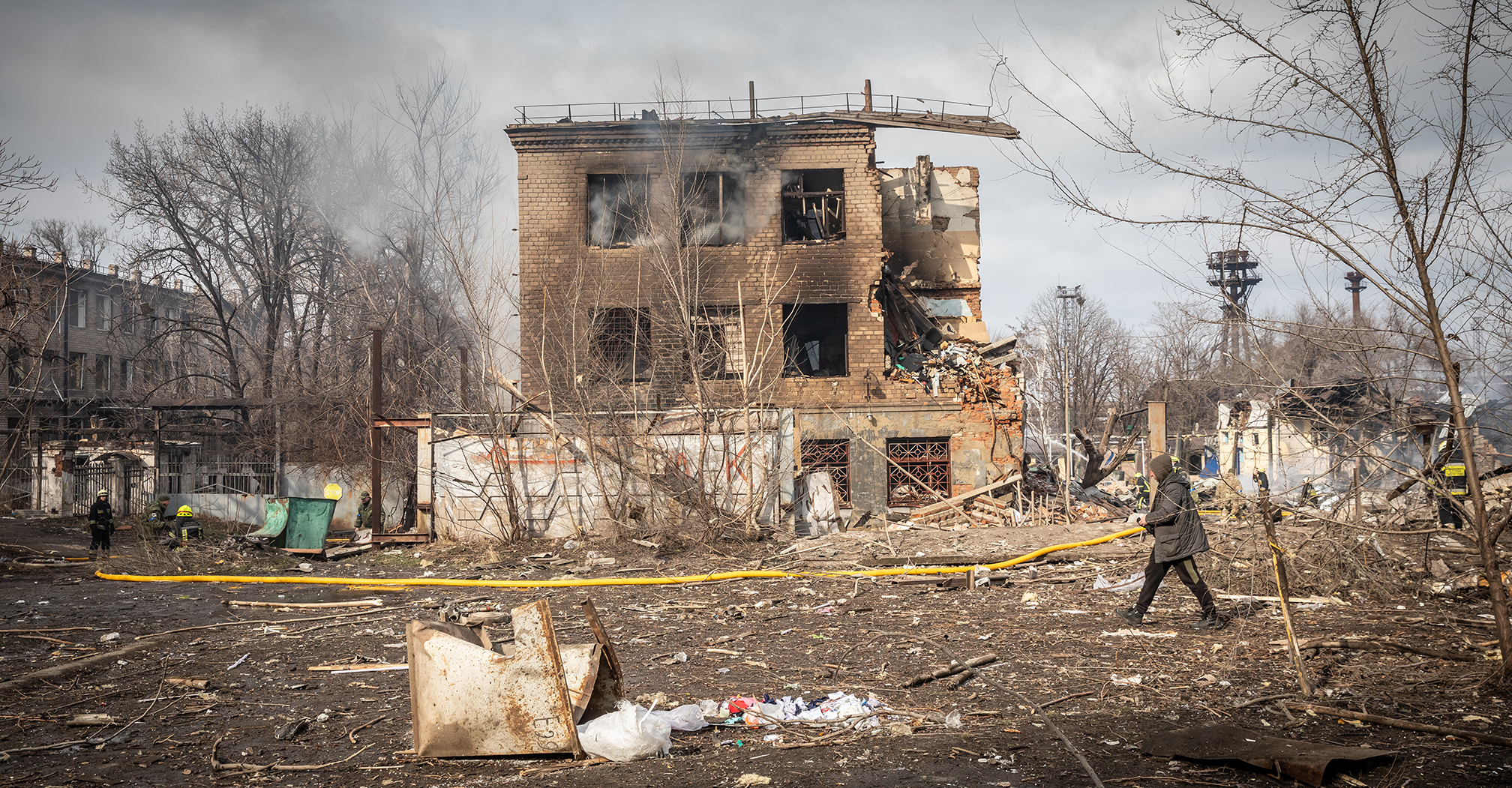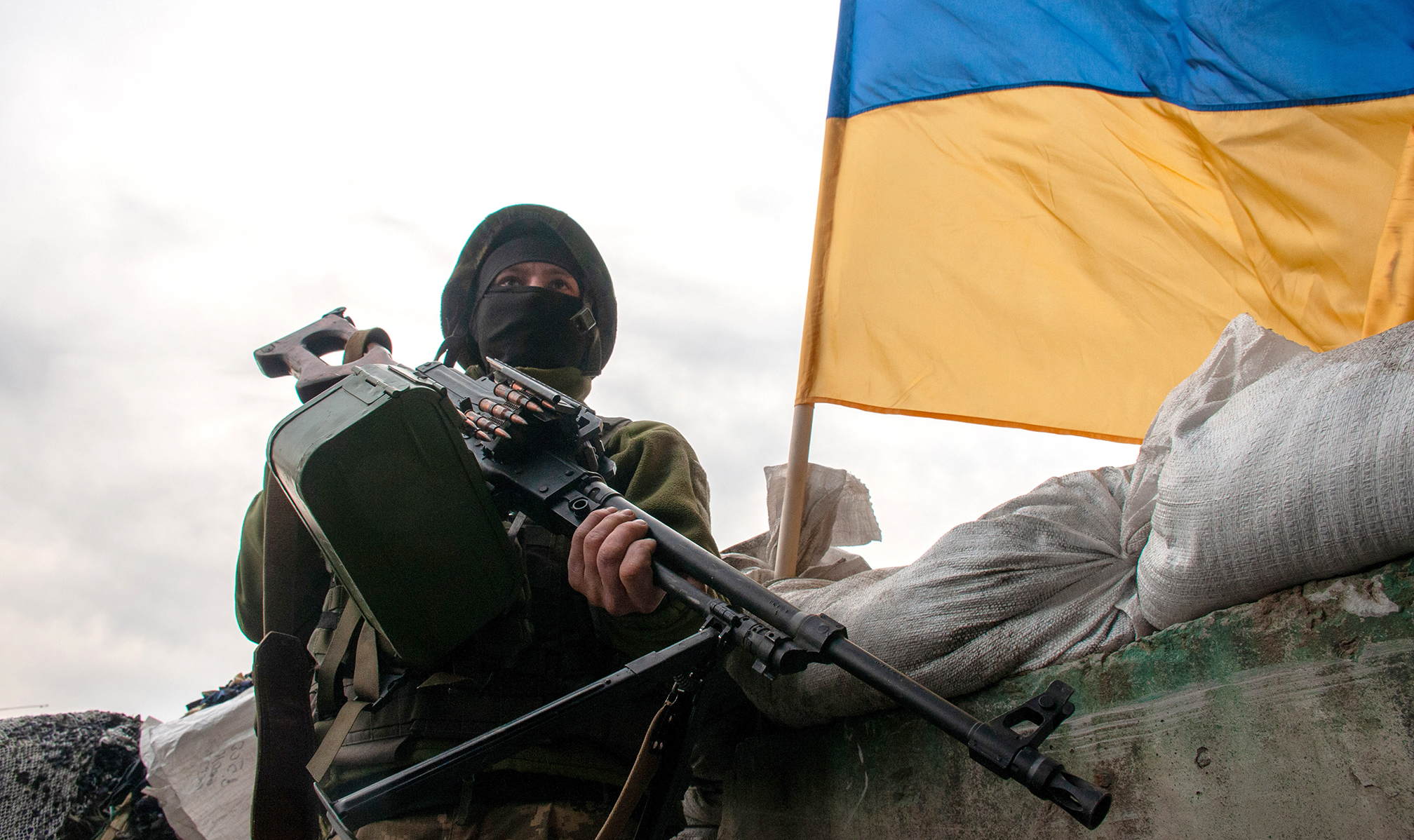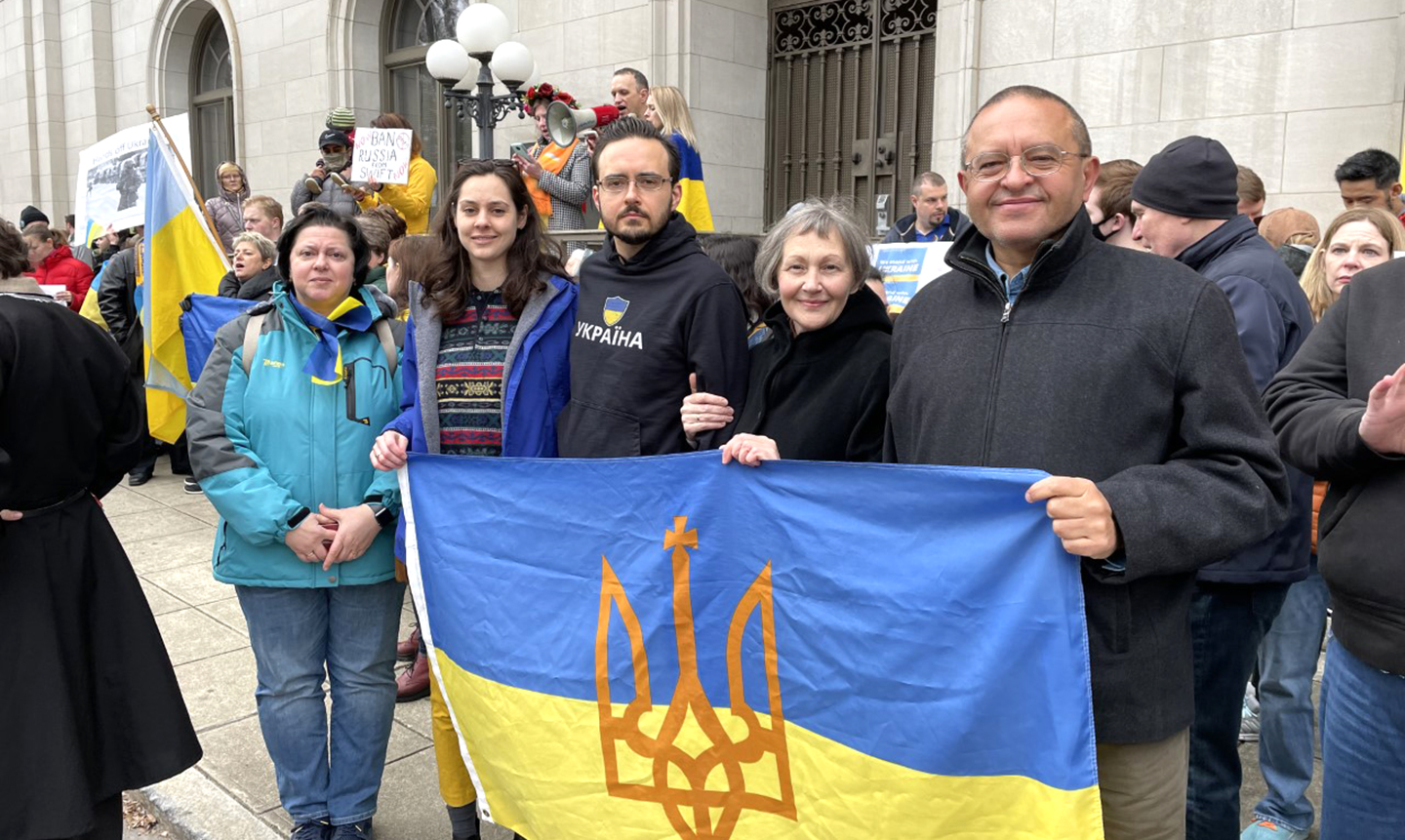
__________________
School of Medicine professor shares his thoughts, daily struggles on the war in his native Ukraine
It’s been 42 days since Russia invaded Ukraine, and in that time, images and video coming from the warzone have revealed a veritable hell on Earth for the men, women and children caught in the crossfire.
Dr. Oleg Alekseev lives 5,000 miles from his native Ukraine, but he’s living the war every day through regular contact with family members who stayed behind. His mornings for the past six weeks have begun with a call to his 80-year-old mother-in-law who chose to stand her ground despite having a valid U.S. visa and family who could take her in.
“She says, ‘This is my house, and this is where I’m supposed to be,’” Alekseev says. “She says, ‘I was born in a war, and if God decides that I’m going to die in a war, then I will die here.’ She’s a pediatrician, and even at 80, she’s helping people there. She’s a hero there.”
The same goes for his brother-in-law and nephew — like Alekseev, they’re all doctors, and they’re all staying behind out of sense of duty and service to their fellow countrymen.
“They work in the hospitals, and, yes, they’re worried. They hear the explosions. They see the violence,” Alekseev says. “But they continue to work, because somebody has to.”
As of April 2, more than 1,400 Ukrainian civilians (153 children) have been killed as a result of the Russian Federation’s armed attack, according to the Office of the United Nations’ High Commissioner for Human Rights. And while no official count of Ukrainian soldiers killed in action has been released, some estimate the country has lost thousands of military personnel since the war began.

And recent images of at least 20 bodies strewn across the street and civilians executed with their hands tied behind their backs in the Kyiv suburb of Bucha have captured the world’s attention, sparking global outrage and allegations of genocide and war crimes at Russian President Vladimir Putin.
It’s a daily heartbreak for Alekseev, professor of physiology and pathophysiology for the Jerry M. Wallace School of Osteopathic Medicine at Campbell University. Alekseev was born just outside of Kyiv, the capital city of Ukraine, and he earned his medical degree and Ph.D. in human anatomy from Kyiv Medical University. He taught at the same university, in addition to Ukraine’s Uzhgorod State University, Moscow People’s Friendship University in Russia, Hokkaido University in Japan, the University of Iowa and UNC-Chapel Hill before coming to Campbell in 2013 when the University launched its med school.
In Alekseev’s last year of medical school in 1986, Ukraine experienced history’s worst nuclear meltdown at Chernobyl — a disaster that led to the evacuation of 49,000 people and thousands of exposure-related deaths in the years that followed. Alekseev lived just 25 miles from the site, and he and other young men his age were “drafted” by the nation’s government and sent there to help people cope with radiation exposure — an experience that remains vivid to this day.
Before the Russian invasion in February, Ukraine had not experienced this level of violence in 80 years since World War II. Then, the majority of Ukrainians fought in the Red Army against Nazi Germany, which occupied the country in 1941. Between 5 and 7 million died during the war — including 1.5 million Ukrainian Jews — a loss of roughly 15 percent of the nation’s total population. The years and decades that followed the Great War marked an era of postwar reconstruction, and industrial and agricultural production wouldn’t reach pre-war levels until the late 1950s and early 1960s.

Alekseev grew up in a Ukraine under Soviet rule — the western part of the nation grew to become more European in nature, while the east remained more Russian-oriented in culture and language. Alekseev says it was a great place to grow up and raise a family — a country with black soil so rich that “you can stick anything in it, and it will grow,” and a humidity-free climate so great that “I couldn’t even imagine there could be something different in the world,” he says.
“Last summer, we had a surge of tourists from the United Arab Emirates, and they were surprised at how green everything was,” he recalls. “And it was amazing for them, and amazing to me, because I never imagined tourists from that part of the world would want to come to Ukraine.”
His biggest pride point in his native country is its patriotism — which even amid horrible violence and the atrocities of war, has been on display all over the world since February.
“The people are historically patriotic,” he says. “And you are seeing that patriotism on display.”
Not just in the resolve of a young president, Volodymyr Zelensky, who has become a global symbol of leadership and bravery in the shadow of a much larger invading nation, but also in the millions of civilians who chose to stay — many of whom have taken up arms and trained to protect themselves and their neighbors.
“Those who think this will end with our people saying, ‘OK, we will live in Russia,’ it’s not going to end like that. We won’t give up. I predict a very, very long fight — a guerilla war against 18- and 20-year-old Russian boys who don’t even want to be there.”
____________________________________

Two weeks after the start of the invasion, Alekseev was sitting in his office in the nursing building when he got a call that he was needed next door in the medical school. Thinking it was some sort of academic emergency or surprise meeting, he hurried across the health sciences campus only to find a group of students in the lobby of Levine Hall, holding a makeshift Ukrainian flag with the words “We support you” written across it.
Touched by the sentiment and the show of support, Alekseev was at a loss for words. The previous days had taken a toll on him mentally.
“We had a thunderstorm recently, and it woke me up and woke my whole family up … I think, ‘Oh, the Russians are bombing us,’ because we are so in that mindset. Maybe somebody is shooting,” he says. “We stay up until 1 a.m. some nights because we’re checking CNN or checking Ukrainian sources. We call family first thing in the morning to make sure everybody is OK. It’s terrible for all of us. I never thought it would be so difficult to cope with.”
The support from his students and colleagues helps, and support is arriving in other forms as well. Alekseev shows a picture of him, his wife (a scientist for Pfizer), his son and his daughter-in-law holding the blue and yellow Ukrainian flag at a rally in Raleigh — an event that drew Ukrainians, Americans, Georgians and, yes, Russians who oppose the invasion. Another photo shows a table full of floral arrangements at his home, brought to them by neighbors and friends.
Alekseev is a proud Ukrainian, and he is a proud American. He is proud to see many Americans support strong sanctions against Russia and accept higher gas prices while supporting a ban on Russian oil. Through early April, the U.S. and other NATO countries have kept their troops out of Ukraine to prevent a world war but have backed Zelensky and the country’s military with weaponry and other forms of aid. But the potential for an international conflict involving Western nations is very real. On April 5, Chairman of the Joint Chiefs Gen. Mark Milley told Congress that Russia’s invasion is “the greatest threat to world peace and security of Europe and perhaps the world” in the last 40-plus years.

Alekseev said he understands the U.S.’s careful approach, but he cautions Americans who think a war 5,000 miles away has no effect on life in the western hemisphere.
“Five thousand miles is a long way, but 20 miles off the coast of Wilmington is not,” he says, referring to the 2019 incident when a Russian spy ship was spotted in international waters off the North Carolina coast. “I’ve been trying to put myself in the shoes of the people who are making decisions. If I’m President Biden, it’s easy to just say, ‘Close the skies in Ukraine,’ but that means having to shoot down Russian planes. And Putin said very clearly that if somebody is helping Ukraine, it’s the same as declaring war, with all the consequences. So it’s not an easy decision.
“But Putin is also like every bully out there. Let’s say he destroys Ukraine — tomorrow, it’s Poland. After that, it’s the Baltic states. And if you start a war, there will be a nuclear attack, and it will be endless.”
It’s Alekseev’s opinion that the United Nations has become weak, and the U.S. has become less of a “world leader” over the years. He points to the country’s handling of its removal of troops from Afghanistan, and he sees mistakes in its handling of Russia and Ukraine. Again, he understands the decision not to fight, but he’d like to see more vigorous sanctions.
“Ukraine had to lose its nuclear weapons, with a promise of being protected. Today, that sounds like a joke,” Alekseev says.
There are a lot of different opinions and ideas of the way the U.S. and its international allies should handle Russia and its invasion of the second largest country in Europe, and Alekseev understands that he’s just one man with one opinion. But experience matters, and the opinion of native Ukrainians like Alekseev — who’s living the nightmare through family and friends and constant media reports of death and destruction.
“Ukrainians and Americans, we are all on the same boat,” he says. “We are fighting for the future of the planet and for the future of humanity.”
Alekseev recalls a phone call with his mother-in-law the night before sharing his story and his thoughts. As usual, he and his wife expressed their worry about her safety. He’s been sending money to his family regularly since the start of the invasion, but there’s still a feeling of helplessness.
“She tells us she put a mattress over the toilet. Why? Because if something falls on it, it would destroy it. She’s put tape on her windows. Why? So it won’t shatter if there’s an explosion outside. There’s a mattress in the hallway. Why? Because if there is shooting outside, she can go to that safe place and not be near any windows,” he says. “We don’t know what else to do to help, but she knows what she’s doing. She’s the most sober thinking, balanced person in this situation.
“She was born during World War II. She’s strong. She’ll be OK.”